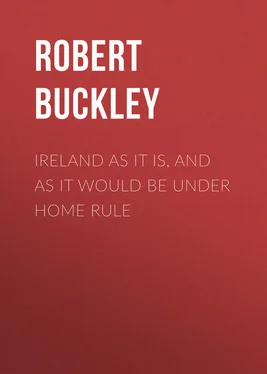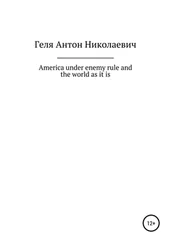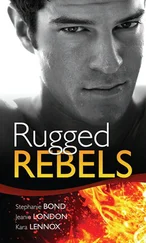Robert Buckley - Ireland as It Is, and as It Would Be Under Home Rule
Здесь есть возможность читать онлайн «Robert Buckley - Ireland as It Is, and as It Would Be Under Home Rule» — ознакомительный отрывок электронной книги совершенно бесплатно, а после прочтения отрывка купить полную версию. В некоторых случаях можно слушать аудио, скачать через торрент в формате fb2 и присутствует краткое содержание. ISBN: , Жанр: foreign_antique, foreign_prose, на английском языке. Описание произведения, (предисловие) а так же отзывы посетителей доступны на портале библиотеки ЛибКат.
- Название:Ireland as It Is, and as It Would Be Under Home Rule
- Автор:
- Жанр:
- Год:неизвестен
- ISBN:http://www.gutenberg.org/ebooks/29710
- Рейтинг книги:5 / 5. Голосов: 1
-
Избранное:Добавить в избранное
- Отзывы:
-
Ваша оценка:
- 100
- 1
- 2
- 3
- 4
- 5
Ireland as It Is, and as It Would Be Under Home Rule: краткое содержание, описание и аннотация
Предлагаем к чтению аннотацию, описание, краткое содержание или предисловие (зависит от того, что написал сам автор книги «Ireland as It Is, and as It Would Be Under Home Rule»). Если вы не нашли необходимую информацию о книге — напишите в комментариях, мы постараемся отыскать её.
Ireland as It Is, and as It Would Be Under Home Rule — читать онлайн ознакомительный отрывок
Ниже представлен текст книги, разбитый по страницам. Система сохранения места последней прочитанной страницы, позволяет с удобством читать онлайн бесплатно книгу «Ireland as It Is, and as It Would Be Under Home Rule», без необходимости каждый раз заново искать на чём Вы остановились. Поставьте закладку, и сможете в любой момент перейти на страницу, на которой закончили чтение.
Интервал:
Закладка:
The opinion of Tipperary men on the question of religious toleration is practically unanimous. Pass Home Rule and the Protestants must perforce clear out. As it is, they are entirely excluded from any elective position, their dead are hooted in the streets, their funeral services are mocked and derided by a jeering crowd. The other day a man was fined for insulting the venerable Protestant pastor of Cappawhite, near Tipperary, while the old man was peacefully conducting the burial service of a member of his congregation. Foul oaths and execrations being meekly accepted without protest, a more enterprising Papist struck the pastor with a sod of turf, for which he was punished. But, returning to our muttons, let me conclude with three important points:
(1) Mr. Smith-Barry built the Town Hall of Tipperary at a cost of £3,000, and gave the use thereof to the Town Commissioners for nothing. He spent £1,000 on a butter weigh-house, £500 on a market yard, and tidied up the green at a cost of £300. He gave thirty acres of land for a park, and the ground for the Catholic Cathedral. He offered the land for a Temperance Hall (I think he promised to build it), on condition that it was not used as a political meeting-house. The Catholic Bishop declined to accede to this, and the project was abandoned.
(2) Several dupes of the Land League, for various outrages, were sentenced to punishment varying from one year's hard labour to seven years' penal servitude.
(3) O'Brien, M.P., and Dillon, M.P., who had brought about the trouble, were with others convicted of conspiracy, and were sentenced to six months' imprisonment. But this was in their absence, for soon after the trial commenced, being released on bail, they ran away, putting the salt sea between themselves and their deservings. Heroes and martyrs of Ireland, of whom the brutal Briton hears so much, receive these patriots into your glorious company!
The spirit of Tipperary is ever the same. No open hostility now, but the fires of fanaticism are only smouldering, and only a breath is needed to revive the flame. Every Protestant I saw, and all the intelligent and enlightened Catholics, concur that this is so, and that Home Rule would supply the needful impulse. These men also submit that they understand the matter better than Mr. Gladstone and his patch-work party.
Tipperary April 12th.
No. 9. – TYRANNY AND TERRORISM
The peasantry and small shopkeepers of this district can only be captured by stratagem, and this for two reasons. Their native politeness makes them all things to all men, and their fear of consequences is ever before them. Their caution is not the Scotsman's ingrained discretion, but rather the result of an ever-present fear. English working men of directly opposite politics chum together in good fellowship, harbouring no animosity, agreeing to differ in a friendly way. It is not so in Ireland. The Irish labourer is differently situated. He dare not think for himself, and to boldly speak his mind would mean unknown misfortunes, affecting the liberty and perhaps the lives of himself and those nearest and dearest to him. That is, of course, assuming that his opinions were not approved by the village ruffians who watch his every movement, of whom he stands in deadly terror, and whom he dreads as almost divining his most secret thoughts. A direct query as to present politics would fail in every case. As well try to catch Thames trout with a bent pin, or shoot snipe with a bow and arrow. My plan has been to lounge about brandishing a big red guide-book, a broad-brimmed hat, and an American accent; speaking of antiquities, shortest roads to famous spots, occasionally shmoking my clay dhudeen with the foinest pisantry in the wurruld and listening to their comments on the "moighty foine weather we're havin', Glory be to God." They generally veer round to the universal subject, seeking up-to-date information. Discovering my ignorance of the question, they explain the whole matter, incidentally disclosing their own opinions. The field workers of this district are fairly intelligent. Most have been in England, working as harvesters, and some of the better-informed believe that in future they will be compelled to live in England altogether.
A fine old man, living by the roadside near Oolagh, said: – "I wint to England for thirty-four years runnin', and to the same place, in North Staffordshire, first wid father, thin wid son. Whin I got too ould an' stiff I sent me own son. First it was old Micky, thin it was young Micky. He's away four months, and brings back enough to help us thro' the winter, thanks be to God. The other time he mostly works at the big farrum beyant there. Whin they cut up the big farrums into little ones, nayther meself nor Micky will get anything, by raison we're dacent, harmless people. 'Tis the murtherin' moonlighters will get the land, an' me son wouldn't demane himself by stoppin' in the counthry to work for them. First 'twas the landlords dhrove us away, next 'twill be the tenants. We're bound to be slaughtered some way, although 'twas said that when we 'bolished the landlords we'd end our troubles. But begorra, there's more ways o' killin' a dog than by chokin' him wid butther." There is a growing feeling among the farmers that the land will be heavily taxed to raise revenue, and that this means expatriation to the labouring classes, who will swarm to England in greater numbers than ever.
Another grand old man, named Mulqueen, spoke English imperfectly, and it was only by dint of frequent repetition that his meaning could be mastered. Well clothed and well groomed, he stood at his cottage door, the picture of well-earned repose. Thirty-two years of constabulary service and twenty-one years in a private capacity had brought him to seventy-five, when he returned to end his days on his native spot, among Irish-speaking people, and under the noble shadow of the Galtee Mountains. Divested of the accent which flavoured his rusty English, Mr. Mulqueen's opinions were as follows: —
"I am a Home Ruler and I voted for a Nationalist. But I am now doubtful as to the wisdom of that course. I see that Irishmen quarrel at every turn, that they are splitting up already, that the country under their management would be torn to pieces, that the people would suffer severely, and that England would have to interfere to keep our leaders from each other's throats. It was Irish disputes that brought the English here at first. In the event of an Irish Legislature Irish disagreements would bring them here again. We'll never be able to govern ourselves until the people are more enlightened." I left this sensible and truly patriotic Irishman with the wish that there were more like him. He was a pious Catholic, and regretted to learn that I was otherwise, admitting in extenuation that this was rather a misfortune than a fault, and, with a parting hand-shake, expressing an earnest hope that "the golden gates of glory might open to receive my sowl, and that we might again convarse in the company of the blessed saints in the peaceful courts of heaven." This old-fashioned pious kindliness is hardly now the mode, and isolated instances can rarely be met with even in remote country districts.
Running down to Limerick, I witnessed a warm contention between a Unionist from Belfast and a commercial traveller from Mullingar, a hot Home Ruler, the latter basing his arguments on alleged iniquitous treatment of his father, a West Meath farmer, and defending boycotting as "a bloodless weapon," which phrase he evidently considered unanswerable. The Land League he contended was a fair combination to protect the interests of the tenants, and avowed that all evictions were unwarrantable acts of tyranny. The Belfast man showed that these arguments were equally applicable to the other side, and asked the patriot if eviction were not likewise "a bloodless weapon," to which inquiry the Mullingar man failed to find the proper answer, and, not coming up to time, was by his backers held to have thrown up the sponge. This incident is only valuable as showing the poor line of country hunted by the more brainy Nationalists. A County Clare man boasted of his collection of Irish curiosities. "I have the pistol O'Connell shot So-and-So with, I have the pistol Grattan used when he met Somebody else, I have the sword of Wolfe Tone, the pike that Miles O'Flanagan – " Here the Ulsterman broke in with —
Читать дальшеИнтервал:
Закладка:
Похожие книги на «Ireland as It Is, and as It Would Be Under Home Rule»
Представляем Вашему вниманию похожие книги на «Ireland as It Is, and as It Would Be Under Home Rule» списком для выбора. Мы отобрали схожую по названию и смыслу литературу в надежде предоставить читателям больше вариантов отыскать новые, интересные, ещё непрочитанные произведения.
Обсуждение, отзывы о книге «Ireland as It Is, and as It Would Be Under Home Rule» и просто собственные мнения читателей. Оставьте ваши комментарии, напишите, что Вы думаете о произведении, его смысле или главных героях. Укажите что конкретно понравилось, а что нет, и почему Вы так считаете.












